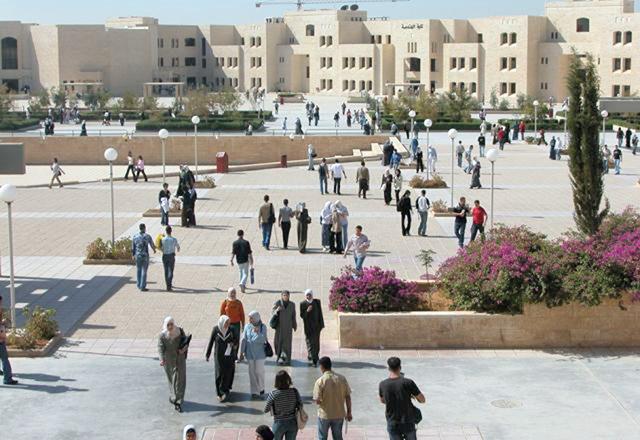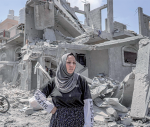You are here
Largest cross-media youth survey draws portrait of new generation
By Camille Dupire - Apr 17,2018 - Last updated at Apr 17,2018

AMMAN — A feeling that millenials’ opinions are still under-represented in Arab public opinion triggered the launch of “Generation What?”, an EU project aimed at drawing portrait of the new generation through the largest cross-media youth survey ever-made.
Started with the aim of better understanding the main trends and concerns of Arab citizens and of collecting testimonies from youth between the ages of 18 and 34 years old, the 167-question survey has been made available to online users in Jordan, Morocco, Algeria, Tunisia and Lebanon, collecting over 7,600 responses in Jordan in one month.
“We wanted to make young peoples’ voices heard by allowing them to express their opinions on work, family, future, equality, love and power, among many other topics,” Valerio Caruso, the projects’s team leader, told The Jordan Times, noting that “this will allow us to compare the answers with those of thousands of other Arab and European young people and draw a clearer picture of this new generation”.
Launched only a month ago, the campaign has already revealed a number of results, highlighting education, health and job opportunities as the main concerns for young Arabs, and a surprising closeness of opinions with youth from other parts of the world.
“We asked participants to choose their three biggest concerns out of a list of 16 propositions, ranking them from the ‘most concerned about’ to the ‘least’ and we found out that many of the tendencies were similar to the ones observed in Europe and other continents,” Caruso remarked.
The survey, which was drafted by an international team of sociologists to ensure scientific accuracy, pointed to the education system as the first and foremost concern for Arab millennials, with 51 per cent of them ranking this as "the top of their concerns".
The health system came second (40 per cent), just before getting a job (38 per cent). Other challenges included insecurity, ranked fourth with 32 per cent, the recession and the financial crisis, reaching 27 per cent, while environment, spending power and access to housing were ranked roughly the same at 20 per cent.
“This first general tendency is only but a sketch for now — we will have to wait six months to get the consolidated results, as the current sample only contains 2,500 young people. But what stroke the sociologist working on the survey is the similarity of these concerns compared to millenials in other parts of the world,” the Generation What? Team said, citing European youth's ranking of education as one of the top concerns with 28 per cent (going up to 37 per cent in France).
"Each participating country has its own website, with a survey tailored to the country's cultural and political context," Caruso explained, stressing that thanks to a database updated in real time, users can instantly compare their answers to those of youth from their country, region and the world on interactive maps. They can also watch video compilations of millennials taking the survey, showing different opinions they can relate to."
According to the team leader, this survey has a double mission. "On one hand, we offer young people a tool for dialogue, while assessing their identity; the 18-34 generation is inheriting a chaotic, globalised and interconnected world, where they do not yet have a place. It is the most educated generation in history, one that will be tasked with building the 21st century. Therefore, we need to provide them with the means to express themselves and their identity," he said.
"On the other hand, the programme also allows broadcasters to reconnect with a generation that today abandons them for social networks. The survey itself is only the very first step of a much broader communication strategy that involves not only the media but civil society and youth associations working together towards the same goal of dialogue and participation," Caruso continued.
Four to six months after the launch of the campaign, the findings will be made public, with the aim of generating wide-ranging debate in each country and across the region.
The Jordanian survey already allowed a number of issues to be raised, mainly surrounding the youth's distrust of politicians, with 90 per cent of them considering politicians to be "fully or at least partly corrupted" and 64 per cent considering that “politicians no longer have any power”.
This distrust extended to the entire field of politics, with 46 per cent saying they “do not trust politics at all” and another 48 per cent who “do not trust them or trust them partly”.
However, young Jordanians expressed a much higher opinion towards security forces with 60 per cent voicing their trust of the police and 68 for the army. Other groups of concern included the legal system, religious, political and humanitarian organisations, and the media.
An interesting outcome was the youth’s reliance on news media, with almost 80 per cent saying that “they could not be happy without news reports”.
Further results about the Kingdom and the region can be found at arab.generation-what.org.
Generation What? Arabic is financed by the European Union and implemented by the European Broadcasting Union in cooperation with the Arab States Broadcasting Union and the Permanent Conference of the Mediterranean Audiovisual Operators following a concept developed by YAMI2 and Upian, according to its website.
Related Articles
AMMAN — Three out of four young Arabs are globally “optimistic” about their future, a percentage higher than some of their European counterp
AMMAN — Jordanian youth are more optimistic about their future, according to a recent survey.The results of 13th annual ASDA’A BCW Arab Yout
AMMAN — An opinion poll, issued by the Centre for Strategic Studies at the University of Jordan to mark the passing of one and a half years

















